2022 Freezer Challenge Newsletter
This link contains the 2022 Freezer Challenge Newsletter:

This link contains the 2022 Freezer Challenge Newsletter:
More information can be found in the attached link.
Becky Chambers Hennessy, writer of R&D World magazine, wrote a Q&A style piece on UIUC's "Winning Streak Award" for the International Freezer Challenge. The piece contains answers from Deborah S. Katz-Downie, Martin Gruebele, and Paul Foote. The piece can be found here.
On October 20, 2021, the 2021 Energy Conservation Incentive Program (ECIP) Award Winners were announced at the Campus Sustainability Celebration!
UIUC is home to a total of 10 winners and honorable mentions, as listed below according to their categories:
See the attached file to read the official announcement of 2021 ECIP Winners, including the locations' % improvements and monetary savings.
All are invited to the 2021 Campus Sustainability Celebration and appreciation event! Meet and network with your peer sustainability advocates and hear about exciting campus sustainability progress! Since the event is in person, please be prepared to wear a mask and show your Safer Illinois app or equivalent status. If you can't make it in person, watch the livestream on YouTube! >>>
October 20, 1–4 pm • National Center for Supercomputing Applications lobby, 1205 W. Clark St., Urbana
Julie Wurth • Institute for Sustainability, Energy, and Environment
For the second year in a row, University of Illinois at Urbana-Champaign won the "Winning Streak Award" for earning the most points and saving the most kWh/year of any academic institution. This is the fourth year in a row we have topped the academic sector list! UIUC estimated annual energy savings was at 383,615 kWh's or approximately $32,262.
All of the freezer challenge winners can be found here.
In the 2021 Freezer Challenge, 222 labs participated from over 100 different research institutions across 17 countries. The combined efforts of the scientists and labs saved 4.6 million kWh of electricity over the past year, which is the equivalent of reducing carbon emissions by 3,260 metric tons.
Based on the U of I's submitted scoresheets (33 in total), the combined actions of the university saved a total of 1051 kWh/day across multiple labs throughout campus.
The iCAP Working Group met on 7-22-21. Attached are the meeting minutes. The agenda was as follows:
Dart Container at 1505 E. Main St., Urbana, accepts expanded polystyrene (EPS), more commonly known by its brand name Styrofoam, for recycling. Departments are encouraged to take EPS there to recycle this bulky material. By doing so, we can reduce the volume of waste sent from campus to landfills and avoid the harmful environmental impacts of that practice. There is no charge to drop off EPS at Dart for recycling.
There is currently no central funding source to pay for transportation of EPS to Dart, so departments need to arrange transport independently.
The drop-off location is in a fenced-in area of the Dart parking lot and may be accessed 24 hours a day. Dart accepts foam packaging (except for packaging peanuts), foam cups, foam egg cartons, foam meat trays, foam ice chests, and other foam products that fall within these guidelines:
From fall 2015 until summer 2017, the University of Illinois at Urbana-Champaign (UIUC) ran the Styrecycle program in partnership with Community Resource Inc. (CRI). Ownership of CRI changed in July 2017, and the new owner was not able to continue the program.
Research, managing labs, and personnel keeping you busy? No worries!
International Freezer Challenge Coordinators can enter your lab's information and the cold-storage sample management efforts you have made during the past year.
Any changes, upgrades, cleaning out, defrostings, filter cleanings, and reductions to freezer/refrigerators can all be added to your score sheets.
Sample management, reductions, inventory creation or changes and upgrades, as well as, increasing room-temperature sample-storage inventory are all actions that increase your score and reduce the environmental impact of your lab operations.
All actions in sample management you have made since August 2020 help your lab improve environmental impact, reduce carbon emissions and energy consumption, and are eligible to boost your lab and UIUC's overall point totals in the 2021 International Freezer Challenge.
If you would like us to register your lab and complete your score sheet?
Help UIUC defend our 1st place international standing and win the opportunity to be highlighted and have your photo in NATURE magazine!
For more information and questions about the International Freezer Challenge, please contact Paul Foote, F&S energy efficiency and conservation specialist, gfoote2@illinois.edu, 217-244-1048.
Register now to join the International Freezer Challenge to solidify the Illinois research community's first place track record in cold-storage sample management. Share your efforts and keep the campus at number one!
Did you buy an energy-efficient refrigerator or freezer, discard or unplug a fridge or freezer, clean out samples, start a sample inventory list, adjust a fridge or freezer to a warmer temperature, defrost a fridge, or clean the filters? These actions promote equipment longevity, better sample management, and improve efficiency; they also help you earn points for the Freezer Challenge.
For more information and questions about the International Freezer Challenge, please contact Paul Foote, F&S energy efficiency and conservation specialist, gfoote2@illinois.edu, 217-244-1048.
Take action, register today, and submit your efforts by July 1, 2021.
The Fall 2020 iSEE Quarterly Update (iQ) was released with the following message from Madhu Khanna, the Interim Director of iSEE:
Dear Colleagues,
Attached, please find attached the Fall 2020 “iQ” – the quarterly update from the Institute for Sustainability, Energy, and Environment (iSEE).
It has been two months since I became interim director of ISEE. It has been exciting to see ISEE bring in multimillion-dollar research grants, launch a new research initiative in regenerative agriculture, and help coalesce sustainable agriculture research on our campus during this period.
Our Certificate in Environmental Writing has engaged students in making insightful contributions to a new issue of Q Magazine. We have also expanded our opportunities for education and scholarly discourse with several online events, including those on nuclear energy and geothermal energy research.
We formally launched the new Illinois Climate Action Plan (iCAP 2020) on Oct 20, 2020. This ambitious plan is the result of the hard work of campus sustainability folks who worked hand-in-hand with Facilities & Services and incorporated the vision of hundreds of students, faculty, staff, administrators, and community members into a plan for the next five years and beyond — all the way to carbon neutrality no later than 2050!
I am so grateful to Evan Delucia for his efforts over the first seven years as the first director of our Institute. He has left iSEE as a vibrant part of the Illinois community, and I am working with our outstanding ISEE staff to expand upon the work already begun — as evidenced in this six-page update.
Please take a quick look at those updates and more in “iQ.” For more regular news, please sign up for our E-newsletter at https://illinois.edu/fb/sec/5031776.
Wishing you a successful end to the fall semester,
Madhu
iSEE and F&S are excited to invite you to the Campus Sustainability Celebration 2020! This is an annual event that is especially exciting this year with the signing ceremony of the Illinois Climate Action Plan (iCAP) 2020, (once every five years) and the presentation of energy conservation and Freezer Challenge awards. Everyone is invited and encouraged to stay afterward for a social-hour!
Campus Sustainability Celebration
October 20, 3 pm • Map
Meredith Moore • Institute for Sustainability, Energy, and Environment
 This opportunity is available online.
This opportunity is available online.
Here is a link to the UIUC video and media release article
https://www.youtube.com/watch?v=3b1gi1RpVRU&feature=emb_logo
Hello 2020 researchers!
After winning 1st place internationally in 2018 and 2019, lab researchers who use cold-storage at the University of Illinois at Urbana-Champaign are encouraged to register in the 2020 International Laboratory Freezer Challenge to save energy and help the campus win for a third-straight year.
Sign up HERE!
Campus efforts in more than 70 laboratories across 15 buildings earned Illinois the award last year. The total energy usage in these spaces decreased by an estimated 438 kWh/day or a combined annual total equivalent of 13.5 homes energy for one year.
Worldwide recognition
The University of Illinois research community has received international recognition from a number of organizations and media publications:
Lab Manager Magazine, Cold Storage March 2019 Published article with participants quoted for expert advice here
Nature Magazine feature published in Oct. 2018 and Sept. 2019 edition
S-Labs highlights our achievements in their short-listed profiles here
iSEE and Facilities & Services published news releases U of I Wins Freezer Challenge
Labs that use ultra-ultra low temperature freezers (-150C), ultra-low temperature freezers (-80C), lab freezers (-40C to -20C), refrigerators, or cold rooms can earn points by taking action now.
For more details on how your lab can save cooling energy, visit freezerchallenge.org.
The Freezer Challenge takes place between December 2019 and May 2020. Individual labs self-report and estimate their energy saving on score sheets. These sheets are made available via email upon registration and are due by May 1, 2020.
Reductions were achieved due to the dedication and creativity of researchers across campus in implementing best practices for cold storage management. They received points for taking actions such as properly maintaining freezers and refrigerators, discarding old samples, and retiring unneeded units.
Campus-specific highlights from the 2018 competition and 2019 competition are available on the Illinois Freezer Challenge website.
In 2019, over 400 labs representing 41 organizations around the world competed, and Illinois was named one of three organizational winners by saving 160,000 kWh/year. The Ming Lab in the Department of Plant Biology, managed by Julie Nguyen, was named an honorable mention winner in the individual lab category.
The International Institute for Sustainable Laboratories (I2SL) and My Green Labs run the Freezer Challenge. Participants have already saved over 8.5 million kWh since 2017, approximately enough to offset the carbon emissions associated with driving over 15 million miles.
Past winners were announced at the I2SL conference and their accomplishments published in Nature.
For more information on the Illinois campus achievements and competition, check out our Illinois-specific website: https://freezerchallengeui.wixsite.com/freezerchallenge
Join us and submit your scoresheet by midnight on May 1st to achieve world-class results!
For help getting started contact:
Madeline Barone @ mbarone2@illinois.edu
Madeline E. Barone, B.S.
Environmental Sustainability and Psychology
Energy Efficiency & Conservation Specialist | UIUC Facilities & Services
Co-Director | Eco-Olympics
https://www.linkedin.com/in/madelinebarone/
The registration for the 2020 Freezer Challenge is now open!
Sign-up this year to win for the third year in a row!
Signing up is easy and only takes 2-3 minutes to enter the labs contacts and organization information.
If you would like help signing up, send Your Name (first, last), email, PI’s name, Building and Department, with subject “Please Sign-Up” to: mbarone2@illinois.edu
The challenge takes place throughout the spring semester and participation is self-explanatory, each lab gets points for actions taken to increase lab energy efficiency (see Score Sheet for categories). I will be in contact with all the labs that sign up to support your efforts throughout the semester. The labs with the most points in each laboratory category win the challenge.
Our participation in the North American Laboratory Freezer Challenge supports our Climate Leadership Commitments, campus sustainability, Green Labs, and the Illinois Climate Action Plan (iCAP).
If you are no longer the contact for your lab and you have a different contact that I can replace yours with, please let me know!
Questions can be sent to:
Madeline Barone, email: mbarone2@illinois.edu
University of Illinois F&S | Freezer Challenge Site Coordinator
Eco-Olympics | President
Hello ECIP winners,
When the Energy Conservation Incentive Program (ECIP) was launched in 2013, it included financial awards that distributed some of the centrally managed campus utility funds back to the winning buildings. The calculation system was based on placement (first place to fourth place) in the awards program and the award category (occupant action or energy advancement). You can see the calculation in the attached fact sheet from 2016, if you are interested. With the Integrated and Value-Centered Budget (IVCB) reform, we transitioned this year, and we are closing out the initial phase one of the ECIP.
Some of the original award funding has not yet been allocated to an associated facility improvement project. If you have remaining funds and have not yet committed to a specific project, please do so as soon as possible. All ECIP award funds must be committed by the end of this fiscal year, so please let us know your plans.
Now in phase two, the ECIP awards include a plaque and the associated prestige, and no additional monetary awards (see attached revised fact sheet). Instead, your colleges will benefit directly from the energy savings. Additionally, to increase the visibility of the great progress all of you have made, we are collaborating with the Illinois Solar Decathlon’s Concept Team (incoming freshmen, learning about building systems and sustainability). They will be completing a simple Building-Level Energy Report card for the 50+ ECIP winners this fall. In the spring, I will send those reports to you with an opportunity to connect with the Concept Team members.
Later this week, I will send a follow up email to the FY19 winners with images to help you spread awareness of this award. Congratulations again to all of you, and thank you very much for your past and ongoing contributions to the campus sustainability and energy efficiency efforts.
Sincerely,
Morgan
The University has been recognized for winning the Freezer challenge for a second year in a row, in the magazine Nature. Click the link to go to the site! https://www.nature.com/articles/d42473-019-00288-0
A cool competition for sustainable labs
Laboratory refrigeration requires a surprising amount of energy. Since 2017, the International Laboratory Freezer Challenge has pushed labs to reduce their draw.
Produced by
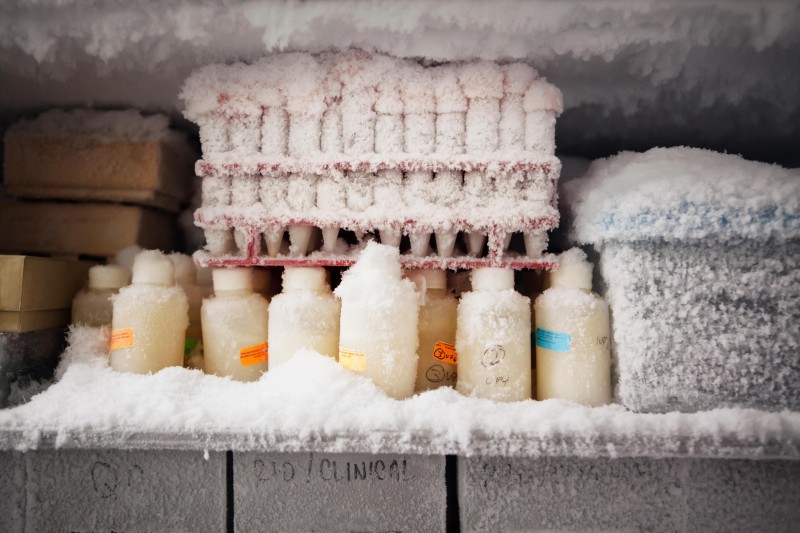
Inefficient freezers waste energy and money.Credit: Cavan Images/ Alamy
For scientists, a good freezer is like a good colleague: integral to doing your best work. But cooling comes at a great cost. Ultra-low temperature freezers, which usually store samples at –80°C, can use as much energy as an average household, and more as they get older. Multiplied by hundreds of thousands of units in labs around the world, that humble lab freezer has quite an energy footprint.
In 2017, My Green Lab and the International Institute for Sustainable Laboratories (I2SL) created the International Laboratory Freezer Challenge* to inspire labs around the world to reduce energy used for cold storage, from refrigerators to the coldest freezers. Individual labs or organizations complete a scorecard detailing the implementation of best practices and energy-saving processes: good management practices, including defrosting freezers; temperature tuning, such as setting a freezer at –70°C or higher; retiring unused refrigerators/freezers or replacing them with more efficient ones; and some unexpected improvements, such as storing certain samples at room temperature.
Labs receive points for every action that they take. In four categories, academia, the biopharma industry, hospitals and government/non-profit, individual labs and organizations that accumulate the most points win. There can be eight winners, all of whom receive an award and recognition in Nature. This year, awards were given to labs and organizations in three of the four categories.
“The number of participating labs in 2019 nearly doubled from 2018,” says Allison Paradise, CEO and founder at My Green Lab, bringing the number of entrants worldwide to about 400 this year.
Organizational winners
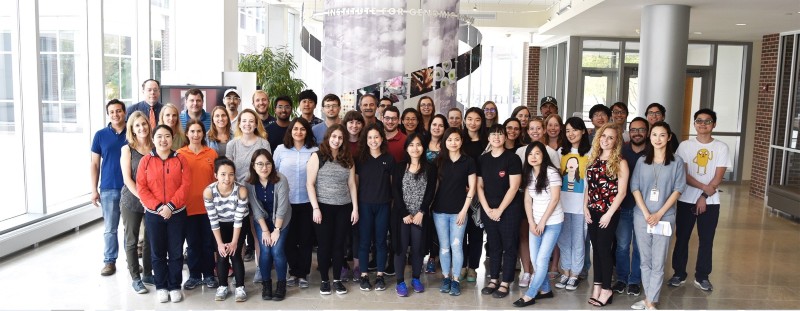
University of Illinois, Urbana-Champaign winning team Credit: University of Illinois
In a repeat of 2018, the University of Illinois, Urbana-Champaign, took the top spot among academic organizations by saving about 160,000 kilowatt-hours (kWh) per year. To win as a university, Madeline Barone, an undergraduate studying environmental science who organized the effort, made it her mission to get as many labs as possible involved. “Following up with people was super important,” she says.
Teamwork also made a big impact in the biopharma-organization category. Charles River — a global, preclincal contract research organization and headquartered in Wilmington, MA — registered all its sites around the world for the competition and encouraged them to compete against each other.
“This led to one of the most meaningful reductions in energy consumption and greenhouse-gas emissions we’ve ever seen,” Paradise says.
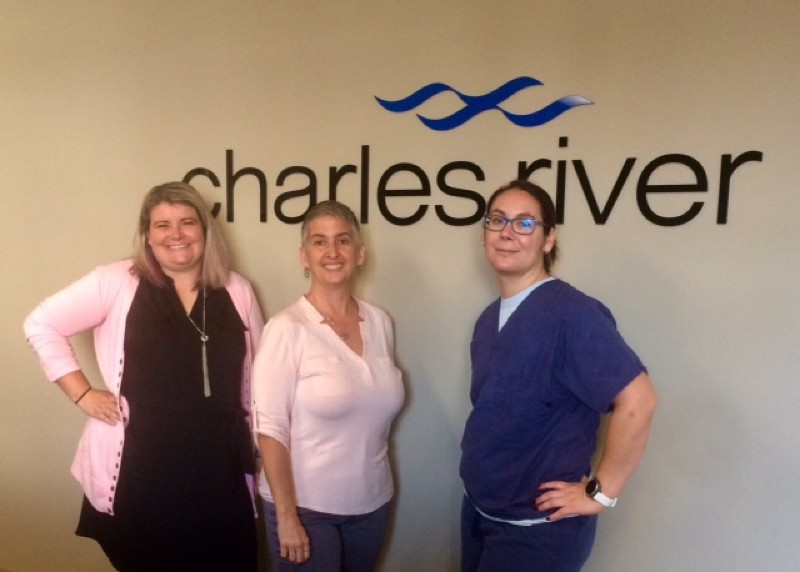
Winning team from Charles River
Charles River, Mattawan (MI), took the top spot. “We entered to see where we stood in relation to industry standards,” says neurobehavioral scientist, Rachel Tapp. The team ended up learning a lot. “Our sustainability crew is new within our Charles River site,” Tapp explains. “So, we learned much about who manages these systems and how they were managed.” Charles River, Mattawan saved about 423,000 kWh a year.
Rounding out the organizational winners, the U.S. Centers for Disease Control and Prevention (CDC) earned a threepeat in the government/non-profit category. Even after wins in 2017 and 2018, the CDC added an estimated saving of 300,000 kWh a year.
Individual winners
Among individual laboratory winners, the Multiple Sclerosis and Parkinson’s Tissue Bank at Imperial College London took the top academic spot. To do that, says tissue bank manager George Gveric, “We increased the temperatures on all our freezers and rearranged samples so that freezers are opened less frequently.”
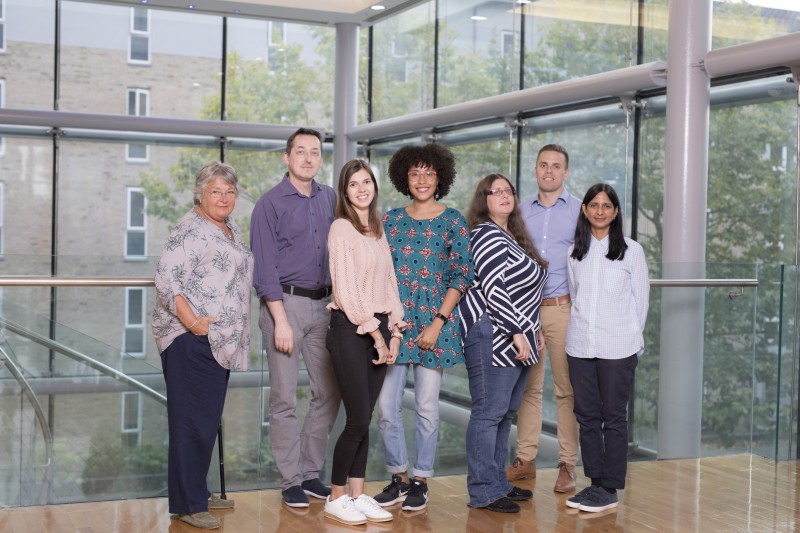
Winning team at Imperial college London
The top honor in the biopharma industry category for an individual lab went to Amyris Biology/Automated Strain Engineering Lab. The start-up is based in Emeryville, CA. Senior associate scientist, Gloria Sagala calls the Freezer Challenge “a great opportunity for our team to come together around a common goal to improve our energy efficiency with our cold storage.” Sagala and her colleagues removed inefficient and unnecessary freezers and implemented a system to track defrosting, saving the lab 30–40% in freezer energy.
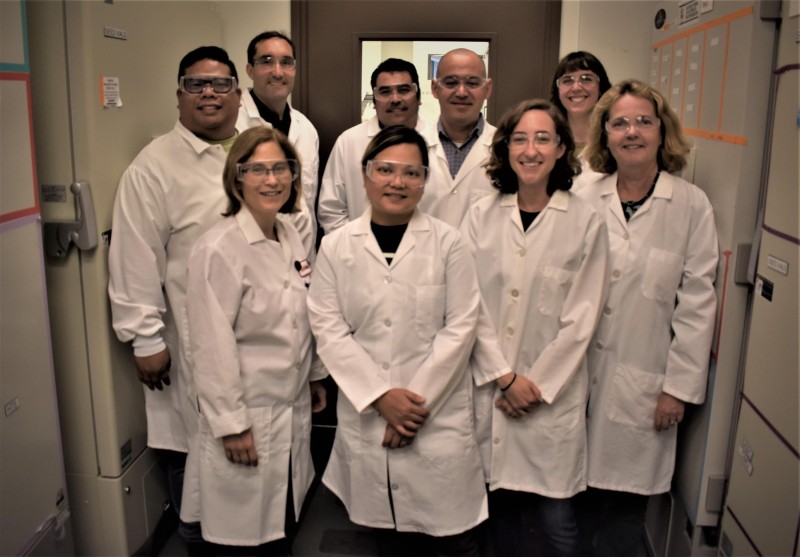
Amyris Biology/Automated Strain Engineering Lab winning team Credit: Amyris Biology/Automated Strain Engineering Lab
An individual lab winner in 2018, the Inorganic and Radiation Analytical Toxicology Branch of the U.S. Centers for Disease Control and Prevention (CDC) teamed up with the Clinical Chemistry Branch to take the individual government/non-profit lab category. “We keep entering because we keep trying to increase awareness of energy use for cold storage in our division,” says Deanna Jones, a team leader in the CDC’s Division of Laboratory Sciences. When asked about the biggest change this year, Jones says, “We have begun buying ENERGY STAR-rated freezers to replace old, less energy efficient ones.”
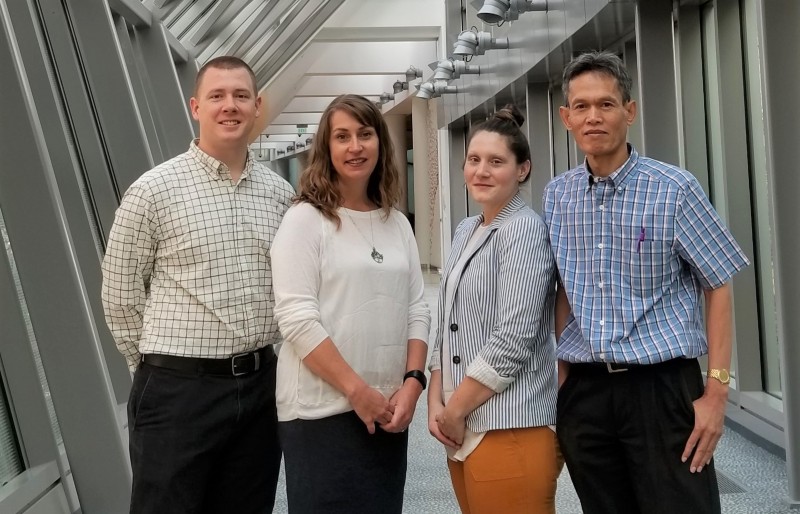
CDC winning teamCredit: CDC
Overall, the combined efforts of participants in 2019 saved about 2.4 million kWh a year. That’s enough energy to power more than 230 average American homes for a year.** Freezer Challenge organizers hope to see that number double again in 2020.
Organizational honorable mention:
• Charles River Laboratories, Leiden
• University of North Carolina at Chapel Hill
• US. National Institutes of Health
Individual-laboratory honorable mention:
• Janssen Immunology Biology Lab at La Jolla, CA, led by Steven Nguyen
• Laboratory Research & Reference Branch, Division of STD Prevention, CDC
• Ming Lab, University of Illinois, Urbana-Champaign, managed by Julie Nguyen

*The Freezer Challenge is made possible through the generous support of sponsors, including 2019’s Gold Sponsors Eppendorf and PHCbi.